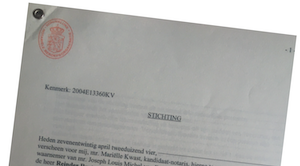Nieuws
Stichting Petities.nl 18 jaar geleden op 27 april 2004 opgericht
Sinds de oprichting van de stichting Petities.nl zijn 16.425 petities doorgelaten, er waren 8.790 pogingen.,15.173 petities verzamelden samen 18.140.533 ondertekeningen. Om dat te vieren krijgt Petities.nl een nieuwe website cadeau deze zomer, de 5e.

Artikel in AD-Amersfoortse Courant en vervolgacties
Op 19 juli plaatste de Amersfoortse courant een artikel over onze petitie. Natuurlijk waren er veel mensen op vakantie, maar toch leidde dit artikel tot een flink aantal nieuwe ondertekeningen.
Zie voor het artikel: http://www.ad.nl/amersfoort/petitie-voor-een-veilige-oversteek-laan-naar-emiclaer~aafd8af1/
In dit artikel zegt Anke Hendriks, woordvoerder van de gemeente Amersfoort, dat de gemeente na de vakantie contact met ons op gaat nemen.
Wij zijn blij met dit aanbod en nemen het graag aan.
Intussen hebben we ook gesproken met Richard van Norden, voorzitter van de winkeliersvereniging van winkelcentrum Emiclaer. Hij gaf aan dat de winkeliersverenging ook al langer met de gemeente in gesprek is over de verkeerssitruatie rondom Emiclaer. Voor de winkeliers is de bereikbaarheid van het winkelcentrum een steeds groter probleem.
We hebben ook enkele zeer bruikbare suggesties voor oplossing van de problemen ontvangen, waaronder een ontwerptekening voor een aanpassing van de kruising tussen de Laan naar Emiclaer en de Bombardonstraat/Knuppelweg! We zullen deze suggesties met de gemeente bespreken.
We houden jullie op de hoogte.
Marion Snoek, Hugo Boog, Wino Penris
De Gelderlander: Petitie voor behoud van bus 43 tussen Geldermalsen en Tiel
GELDERMALSEN/TIEL - Met een petitie strijdt de afdeling Rivierenland van Reizigersorganisatie Rover voor het behoud van bus 43... lees verder op gelderlander.nl.
Texelse courant: Petitie tegen verdwijnen cardiologische hulp
Onder de titel ''Zorg voor Helderse harten'' roept de Noord-Hollandse Gea Mollema op haar petitie te tekenen tegen het verdwijnen van de hartzorg uit Den Helder... lees verder op texelsecourant.nl.
Petitie: 'Provincie moet treinverbinding Nijmegen-Kleve herstellen'
GROESBEEK - Weer met de trein van Nijmegen naar Kleve en andersom. De Vereniging voor Innovatief Euregionaal (rail)Vervoer (VIEV) is een petitie gestart die de Provincie zover moet krijgen er snel werk van te maken.
Het is 25 jaar geleden dat zo'n ritje voor het laatst kon. Bij gebrek aan reizigers werd de lijn in 1991 opgeheven. VIEV stelt dat er nu weer genoeg potentiële treinreizigers zijn om de spoorverbindig nieuw leven in te blazen... http://www.omroepgelderland.nl/nieuws/2114342/Petitie-Provincie-moet-treinverbinding-Nijmegen-Kleve-herstellen
sociale media
Hallo allemaal
deze petitie mag ook op sociale media gedeeld worden
hoe meer handtekeningen hoe beter
.
Petitie is gesloten, eindstand binnenkort bekend
We gaan de ondertekeningen via het internet combineren met de handtekeningen die op papier opgehaald zijn. Binnen een paar weken gaan we het eindresultaat publiceren en overhandigen..
Nog meer handtekeningen!!
We hebben al 425 handtekeningen ontvangen! Nu zou ik er graag nog veel meer zien :) Zou iedereen die dit getekend heeft de petitie op zijn/haar Facebook willen delen voor nog meer steun?.
Bedankt!
In drie dagen plusminus vijftig ondertekenaars, bedankt allen voor uw hulp!
Voorafgaand aan deze petitie zijn er diverse klachten doorgegeven aan de gemeente en kreeg men nul op het rekest. De gemeente hield vol dat de huidige situatie voldoende veilig was en adviseerde onder andere: "de hond onder controle te houden." Een gotspe.
Het is te hopen dat gemeente Alkmaar na het aanbieden van deze petitie de zorgen wel onderkent en actie onderneemt.
Niemand die denkt dat de gemeente kwade bedoelingen had bij het plaatsen van de geleiding begin 2016, maar wanneer burgers zorgen uiten dienen deze serieus genomen te worden. Sinds enkele jaren is er vanuit een hondenbezitter regelmatig contact geweest met de heer Oudshoorn die verantwoordelijkheid draagt voor de groenvoorziening & speelplaatsen in het park de Rekerhout. Vanuit dit contact lijkt het een kleine moeite om, na diverse klachten, in samenspraak met bezorgde hondenbezitters een oplossing te bedenken. In plaats daarvan werd besloten het ijzerdraad nogmaals te plaatsen, nadat deze verdwenen was.
Wij hopen dat deze petitie een positief resultaat en meer flexibiliteit oplevert. Nogmaals dank.